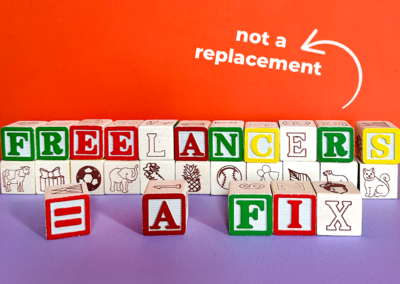Managers often associate “playing at work” with goofing off or wasting company time and money. But what if play was a crucial component to bringing your team together? What if it could help create a sense of belonging and psychological safety in the workplace and rekindle morale — especially surrounded by all this uncertainty? This article explores how play is key to building camaraderie in this surreal new reality of work.
Defining play and what it looks like on work teams
In general, play is any joyful act where you forget about time. When people play at work, they do the work that makes them come alive, also known as their “zone of genius.” Play is the opposite of perfection—which is driven by ego, shame, and fear of failure. Play is rooted in curiosity, a sense of wonder, and a willingness to embrace failures by taking risks.
Why is play beneficial in the workplace?
Studies show that staff are 500% more productive when in a state of flow/play. Play also develops resilience and adaptability in teams, which gives them the ability to improvise—a vital trait needed to navigate all the uncertainty ahead of us. Similar to joy, when leaders focus on building a flourishing environment where play and autonomy can exist, it results in higher job satisfaction and lower turnover.
Where’s the proof that play works in the modern age of work?
While play may seem like a good idea, where’s the proof? During the early years of Google, managers implemented Google’s 20% rule. Staff could use 20% of their time to pursue any project as long as it benefited Google in the long run. This method created some of Google’s foundational products (e.g., Adsense, Gmail, Google Maps, Google News).
Need more proof? The Wright Brothers competed against Samuel Langley and a $2 million funded team of Smithsonian engineers to create the first flying machine. The two bicycle salesmen from Dayton, Ohio, got there first because they saw their work as play.
Bringing your team together: play is not forced fun
Why are certain team-building events cringe-worthy? For the same reason it’s awkward asking a first date if they’d like to go skydiving with you—not enough trust has been built to have this conversation yet.
Examples of forced fun
- A manager pushing staff to play (e.g., icebreakers) and team members pretending to have fun to gain brownie points
- Escape room excursions, trust fall exercises, and a slew of other team-building events
- Ping pong tables that are rarely ever used
- “Mandatory” happy hour
What makes play enjoyable is the ability to choose to participate or not. When staff feels pressure to join these gatherings, it creates cringe-worthy, forced fun. There is a misconception that team-building events build camaraderie when they really reveal a team’s dynamic.
In this video, I role-play some forced fun examples that may feel painfully familiar. But I also show you some alternative approaches that managers can take instead.
How to bring a team together through play
The most basic form of play is attunement. Organizational development researchers define attunement at work as “the relational care and concern that a team exhibits for one another. Teams that are attuned generally care and enjoy one another. Staff sense that they are valued, not only for their contribution.”
Playing at work is more of a mindset than actions. It’s an experience where staff feel comfortable being themselves, speak their minds, and feel a freedom to experiment.
Play like this is vulnerable, and it cannot happen when staff feels unsafe. If trust, understanding, and attunement do not exist within the team, there is no playground for staff to play in.
Where to start
Culture is defined by the worst behavior tolerated, so what toxic habits exist within the team? As a manager, you must confront deep-seated organizational issues to create an environment where your staff wants to play. Are you willing to have these difficult conversations?
Questions worth asking your staff:
- Did we build trust with you or lose it during the pandemic, and why?
- What unspoken issues are we not addressing as a team that get in the way of you doing your best work?
If your company’s values are not represented in your actions as a leader, staff will see the hypocrisy, resulting in a disengaged team and increased turnover.
How managers can implement play on their teams
Once these foundational integrity issues are tackled, you can finally ask, what does play look like in our workplace and how can we use it to bring our team together? The first rule of playing at work is not announcing that you are playing at work. Informing staff “we are now having fun” destroys any possibilities of real fun. Instead:
1. Give staff opportunities to use their strengths (e.g., their zone of genius/ikigai) as part of a team.
In sports, what makes great teams are players knowing each other’s strengths and a coach who knows how to combine them in a complementary way that supports the team. To do this, managers must know each of their staff’s “zone of genius.” What is the work where they forget about time—the work that brings them joy?
2. Cancel any meetings that do not create team attunement.
Great meetings occur when the entire team is attuned and focused on finding solutions and the facilitator can check people’s egos at the door, including their own. Only run meetings where your team can have healthy debate. Removing any meetings that don’t live up to these requirements gives staff more time. More play is possible when there’s more time.
3. Provide your team with the autonomy to experiment and take risks to find solutions.
In this video, I share examples of how a great leader does this in an unlikely arena:
4. Express gratitude to staff through their languages of appreciation, as you celebrate successes and share the failures as a team.
A manager’s job is not to get staff to “play more.” Your job is to create a psychologically safe playground where staff feels comfortable enough to play. They should be sufficiently supported to experiment and take risks in the work setting, and eventually this environment can help them feel open enough to be more themselves at work.
As said in Field of Dreams, “if you build it, they will come.” The question is, are you willing to build a space for your staff to play and thrive? The play (and the genius) will happen organically when team members are ready.
Jeff’s Socials: Instagram, Twitter, LinkedIn, YouTube, TikTok, Medium
Editor’s Socials – Elisa Camahort Page: Instagram, Twitter, LinkedIn



